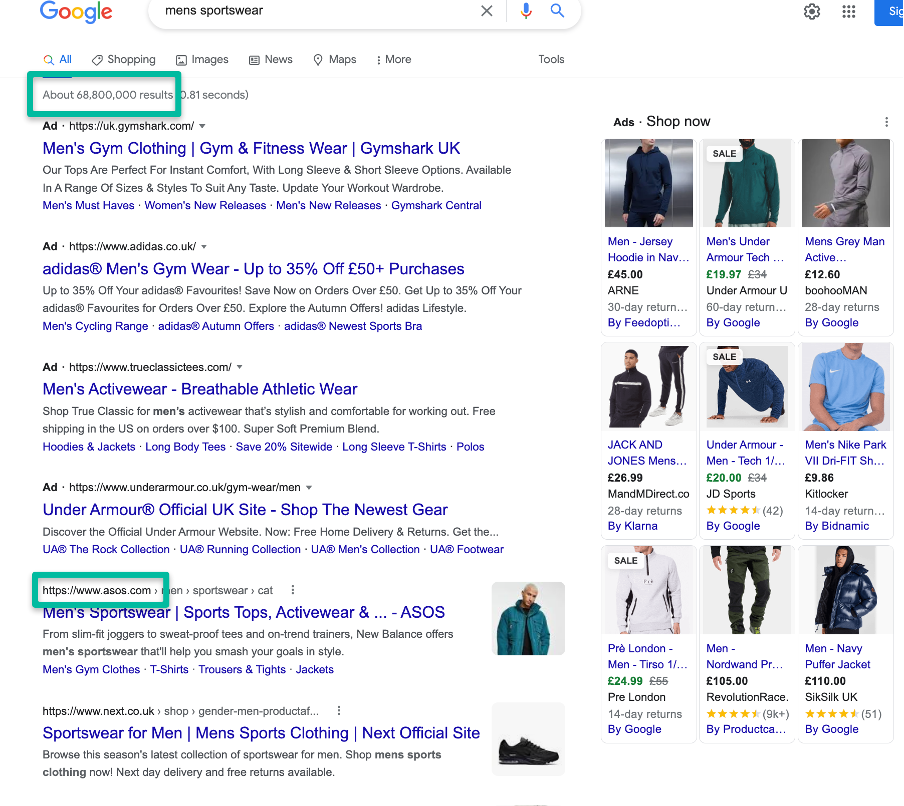SEO can take up to 6 months to start ‘working’. But it can also take much longer. In some cases it can be years. It depends on multiple factors which we’ll go through in a moment.
What factors affect how long SEO can take?
1. How competitive your niche is
If your competitors are big, well-known brands, it can take a lot longer for you to rank on page 1 and start making sales than if your industry is a less competitive one. For example, if you sell men’s sportswear and you want to rank on page 1, you’ll be competing with the likes of Asos, Nike and Sports Direct. There are 82 million results for ‘mens sportswear’, as you can see in this image.

2. How old your domain is
If your website is really new, Google is much more likely to take longer to rank it because it hasn’t crawled it before. It needs to access it, crawl it and index it to be able to rank it.
If Google knows there’s a trustworthy, longstanding ecommerce website and a very new website with no backlinks and broken pages, which one do you think it would rank?
The answer is the longstanding one.
The reason is that the longstanding one has built trust with its site visitors, and Google, over time. The other one hasn’t.
3. How often SEO work gets done
This one sounds obvious, but if you only do something a very small amount once in a while, your results will come slower than if you make bigger dents in your project on a more regular basis. SEO is exactly the same. It needs regular love to ‘work’, and it needs the right kind of love too.
Let’s say you spend 6 months dabbling away at fixing several 404 pages on your website. Don’t get us wrong, you’ll be reducing the number of broken pages on your website, which is great for your readers. But if you’ve not got any quality pages that convert people, you need to address that now.
You are far better off taking a week, or more depending on your resources, to create a set of sparkling new pages that are designed to attract your readers and convince them to buy. Quality is always better than quantity.
4. How many pages you have published and how good they are
If you have thousands of pages, don’t assume that’s automatically a good signal.
Ask yourself:
- Are they broken?
- Are they redirects and slowing your site down?
- Is the page malfunctioning on mobile?
- Is there no obvious, eye-catching call to action?
- Is there no content that talks to your reader?
If you answer yes to any of these, it needs fixing.
5. How good your backlink profile is
If you’ve got thousands of dodgy backlinks (we’ve seen it happen!), your results will absolutely be hindered, compared to a website with a handful of decent backlinks.
6. How often Google indexes your website
If you want to rank on page 1, get traffic and conversions, you need Google to crawl and index your website. You also need it to regularly index it because you should be improving and optimising. The idea is that Google will index your site, notice the changes and it will then rank you accordingly, and you’ll want to rank higher.
Google Search Console can show you when a page was last indexed. If you go to ‘URL Inspection’ and enter your URL, it will show you when it was last crawled. If it was a while ago, you can request it to be re-indexed.

7. How often Google makes a change to the algorithm
Google makes an awful lot of changes and updates different parts of its algorithm throughout the year. It can make between 500 and 600 changes every year. But it can be more. When we say Google algorithm, we’re not trying to confuse you.
All we mean is that Google has a list of things it will check for when it indexes your website, from HTTP status to broken pages. When Google decides to tweak that list because it sees something as a more significant ranking factor, that might affect you.
For example, imagine Google suddenly decided that the number of 404 pages, ie an ‘error’ page, on a given website is the most important ranking factor. The more broken pages you have, the worse you will rank.
Ideally you should have 0, or a very minimal number at the least. But you should check anyway. If you find some broken pages, your rankings are more than likely going to drop because of that update.

*Remember that Google rankings always fluctuate. They go up and down all the time. This is normal.
How long does SEO take to work? Other big questions
Has SEO changed since before 2021?
Yes, lots has changed in SEO. For example, years ago, there was what’s called ‘blackhat SEO’ and ‘whitehat SEO’.
Blackhat SEO is when you optimise your website in a way that goes against Google’s guidelines. Whitehat SEO is when you optimise your website in a way that doesn’t go against Google’s rules.
An example of whitehat SEO would be optimising the fundamental places on your page that Google checks, such as meta data and H tags.
An example of blackhat SEO would be adding tonnes of your target keyword to the page in white so they can’t be seen by the user. Here’s an example of one we’ve put together so you can see what we mean. It’s the same page, but we’ve highlighted the text in the second one because it’s in white.

Now, in 2021, blackhat SEO is absolutely frowned upon and should definitely not be done if you want to stay in the good books with Google.
What are other ranking factors that affect how long SEO takes to work?
The 7 factors above are just touching the surface of the multiple factors that can affect your website’s ability to succeed. Other factors include how often your site gets indexed and how well optimised your site is.
Find out more about our SEO services.




